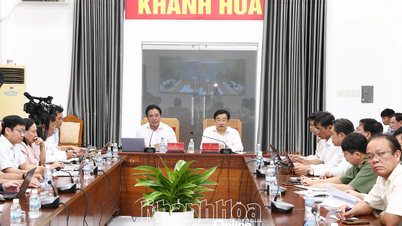 |
| Mr. Nguyen Ngoc Tu - Head of Tax Department of Khanh Hoa province. |
- The project's objective is to eliminate the fixed form of tax that does not accurately reflect business reality, and to switch to self-declaration and self-payment based on invoices, documents, and specific revenue. At the same time, it aims to modernize and comprehensively digitalize tax management, create a synchronous database, strengthen risk management, and reduce at least 30% of compliance time and costs for taxpayers. The project aims for fairness, transparency, and create an equal business environment between business households and enterprises; promote the use of electronic invoices (E-invoices) from cash registers, electronic tax declaration and payment; and form a management system based on actual data. When operating stably, business households have conditions to develop healthily and conveniently transition to an enterprise model. Thereby, contributing more positively to the budget and the economy .
For tax authorities, this conversion helps innovate management methods from manual contracting to data-based and risk-based management; expand IT applications, strengthen post-declaration monitoring, increase budget collection efficiency, and prevent tax losses. For HKD, the new mechanism helps reduce time and travel costs, facilitate policy access, borrowing, and production expansion; raise awareness of tax law compliance, and revenue transparency.
- The project has mentioned many groups of tasks and solutions to transform the tax management model. So, can you briefly introduce the key contents that the tax sector will implement?
- According to Decision 3389, the tax sector will focus on implementing 6 groups of key tasks and solutions in the period of 2025 - 2026 and the following years. Firstly , perfecting mechanisms, policies and legal frameworks. In particular, the tax sector will coordinate with relevant units to review and amend relevant laws and documents such as: Law on Tax Administration, Value Added Tax, Personal Income Tax... in accordance with the self-declaration and self-payment method; develop criteria for classifying business households according to scale and revenue, as a basis for applying the corresponding accounting regime, invoices and documents. Secondly , innovating the tax management process for business households. The tax sector will build a management model towards risk management, data, automating the stages from registration, declaration, payment, tax refund to inspection and examination. Electronic invoices from cash registers will be widely applied, connecting revenue data directly with tax authorities, completely replacing the manual method of determining lump-sum taxes. Third , strengthen digital transformation and modernize IT infrastructure. Accordingly, the tax industry will invest in a centralized data system, integrating information from invoices, banks, sales equipment, e-commerce platforms; develop applications to support business households in declaring, paying taxes, and looking up obligations on mobile devices. Fourth , improve capacity and reorganize the tax management apparatus for business households. Tax authorities will rearrange staff, switch from the "direct management" method to "support - monitoring - data analysis"; train technology skills, risk analysis for staff; strengthen coordination with local authorities, banks, and business registration agencies to ensure synchronous management. Fifth , promote propaganda, support and accompany taxpayers. This is one of the important pillars of the project. The tax sector strengthens widespread communication, training, and direct guidance on electronic tax declaration, use of electronic invoices, cash registers, etc. to help businesses understand and proactively fulfill their tax obligations. Sixth , strengthen inspection, examination, and compliance management based on data. The tax sector will apply Big Data analysis to select the right inspection subjects, avoid trouble, ensure fairness, transparency, improve management efficiency, and prevent invoice fraud.
- The conversion from lump-sum tax to book-based and invoice-based management will certainly create many changes for businesses. In your opinion, what are the difficulties and obstacles in the initial stages of implementation and what solutions does the tax sector have to support taxpayers?
- This is truly a big step forward, demonstrating the determination of the financial sector in modernizing and making transparent tax management for business households. However, the initial implementation phase will certainly have certain difficulties, the biggest of which is changing habits. After many years of implementing lump-sum tax with simple procedures, business households must get used to accounting books, recording revenue, expenses, using invoices and documents, which can make many people confused, especially small and elderly households. In addition, the technological infrastructure and IT level of some business households are still limited; the initial investment cost of equipment and electronic invoice software is also a concern.
Realizing this, the tax sector has implemented many solutions to support taxpayers in adapting. In particular, propaganda and guidance work has been promoted through social networks, videos , and direct dialogues to help business households understand their rights, obligations, and implementation methods. The provincial tax department also focuses on training and fostering civil servants to grasp new policies, directly supporting business households with the motto "holding hands and showing how to do things"; developing friendly, easy-to-use electronic applications, integrated on mobile devices such as eTax Mobile, helping business households declare and pay taxes anytime, anywhere. At the same time, advising the Provincial People's Committee to propose electronic invoice providers to build incentive packages to support business households; coordinating with local authorities to mobilize and support business households to convert smoothly, ensuring smooth and effective implementation.
- Could you please tell us what HKD needs to prepare to meet the new tax management requirements from January 1, 2026?
- To properly implement the regulation that from January 1, 2026, the lump-sum tax collection method for business households and individuals will be completely terminated. Business households need to proactively learn carefully the regulations and circulars guiding new tax management; contact the unit providing e-invoice solutions to register and familiarize themselves with the software. In addition, actively participate in training courses and instructions from tax authorities and tax agents; prepare accounting books and documents in accordance with regulations; promptly report problems to receive support.
It can be said that the elimination of lump-sum tax from January 1, 2026 is an important innovation, enhancing the initiative and self-awareness of taxpayers, creating a positive motivation to promote a transparent and professional business environment. Khanh Hoa Provincial Tax Department is committed to accompanying and supporting business households throughout the transition process. We recommend that individuals and business households proactively coordinate to promptly adapt to the new model.
Thank you!
C.VAN (Implementation)
Source: https://baokhanhhoa.vn/kinh-te/202511/chuyen-doi-mo-hinh-va-phuong-phap-quan-ly-thue-ho-kinh-doanh-can-chu-dong-thich-ung-c5c38b9/


![[Photo] Ho Chi Minh City Youth Take Action for a Cleaner Environment](https://vphoto.vietnam.vn/thumb/1200x675/vietnam/resource/IMAGE/2025/11/04/1762233574890_550816358-1108586934787014-6430522970717297480-n-1-jpg.webp)

![[Photo] The road connecting Dong Nai with Ho Chi Minh City is still unfinished after 5 years of construction.](https://vphoto.vietnam.vn/thumb/1200x675/vietnam/resource/IMAGE/2025/11/04/1762241675985_ndo_br_dji-20251104104418-0635-d-resize-1295-jpg.webp)
![[Photo] Ca Mau "struggling" to cope with the highest tide of the year, forecast to exceed alert level 3](https://vphoto.vietnam.vn/thumb/1200x675/vietnam/resource/IMAGE/2025/11/04/1762235371445_ndo_br_trieu-cuong-2-6486-jpg.webp)
![[Photo] Panorama of the Patriotic Emulation Congress of Nhan Dan Newspaper for the period 2025-2030](https://vphoto.vietnam.vn/thumb/1200x675/vietnam/resource/IMAGE/2025/11/04/1762252775462_ndo_br_dhthiduayeuncbaond-6125-jpg.webp)





















































































Comment (0)